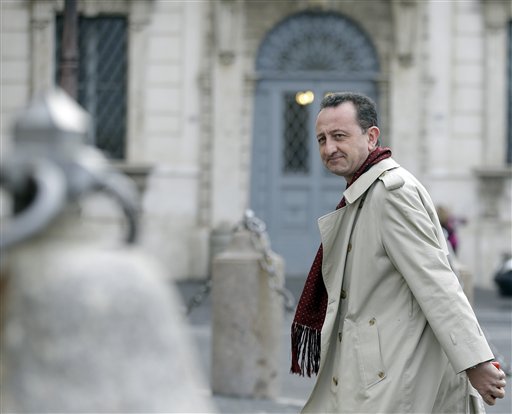
Convicted Mafia boss Toto Riina’s lawyer Luca Cianferoni arrives at the Quirinale Presidential palace in Rome, Tuesday, Oct. 28, 2014. AP Photo
ROME, Italy—An Italian student is appealing for the public to crowdfund his PhD research into the mafia so he can shed new light on organized crime on the streets of Naples where the powerful Camorra syndicate holds sway.
READ: Italy fights mafia with new strategy: banish sons
After being rebuffed by supervisors in Italy who thought studying statistics beat infiltrating the grimy world of extortioners and victims, Mario Trifuoggi decided to move his PhD to London and ask donors to help with the costs.
He is looking to raise £22,000 (29,700 euro) to study at Goldsmiths University alongside others working in the field.
Growing up in an area of Naples dominated by the powerful mafia syndicate left its mark on Trifuoggi, he told AFP.
“In Southern Italy we are portrayed either as victims of these criminal gangs or as complicit in their work,” he said.
“But the reality is a lot more complicated. There is a gray area and I believe that understanding it is the key to tackling the mafia.”
READ: Italy, U.S. crack down on mafia drug smuggling
Trifuoggi wants to research the effects of organized crime on everyday life in southern Italy, explore what prevents people from engaging in collective action and understand how compliance with the mafia is perpetuated.
The Camorra took root during the 19th century unification of Italy as the ruling dynasties collapsed. Instead of cracking down on the gangs, police forces relied on them to “maintain law and order” and the organized crime network flourished.
“Naples is run by around 20 mafia clans with a precarious equilibrium between them,” said Trifuoggi.
“As a teenager, it was not the police or the state that guaranteed my safety but the neighborhood clan.”
‘Out of the mafia’s clutches’
While there are those who appreciate the Camorra’s protection, others have been taking a stand and their resistance will feature in Trifuoggi’s research, as will the use of confiscated assets.
The Libera association, for example, produces mozzarella on land seized from the Camorra and provides valuable employment to local people.
“The employees are not necessarily committed to fighting organised crime but employment keeps them out of the mafia’s clutches,” said Trifuoggi.
He believes that researching what motivates citizens to resist the mafia and getting them to tell their stories will encourage others to engage in collective action to help tackle organized crime.
“Even my crowdfunding campaign is a form of collective action… Those financing my research are collectively tackling the problem of organized crime.”
Trifuoggi initially had a full scholarship to complete his PhD at the University of Trento in Northern Italy but after his supervisors opposed his methodology, he enrolled at Goldsmiths in Britain.
So far, in 24 days, Trifuoggi’s Four Days of Naples Reloaded page has raised £2,093, largely from southern Italians who support his anti-mafia efforts and academics committed to freedom in research.